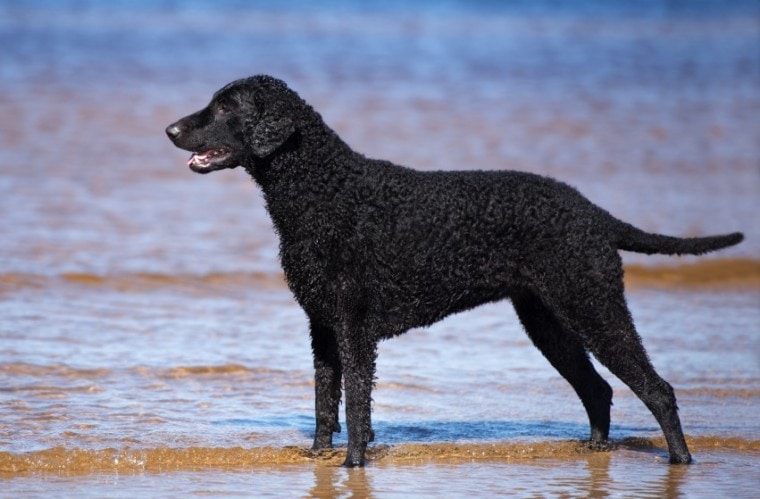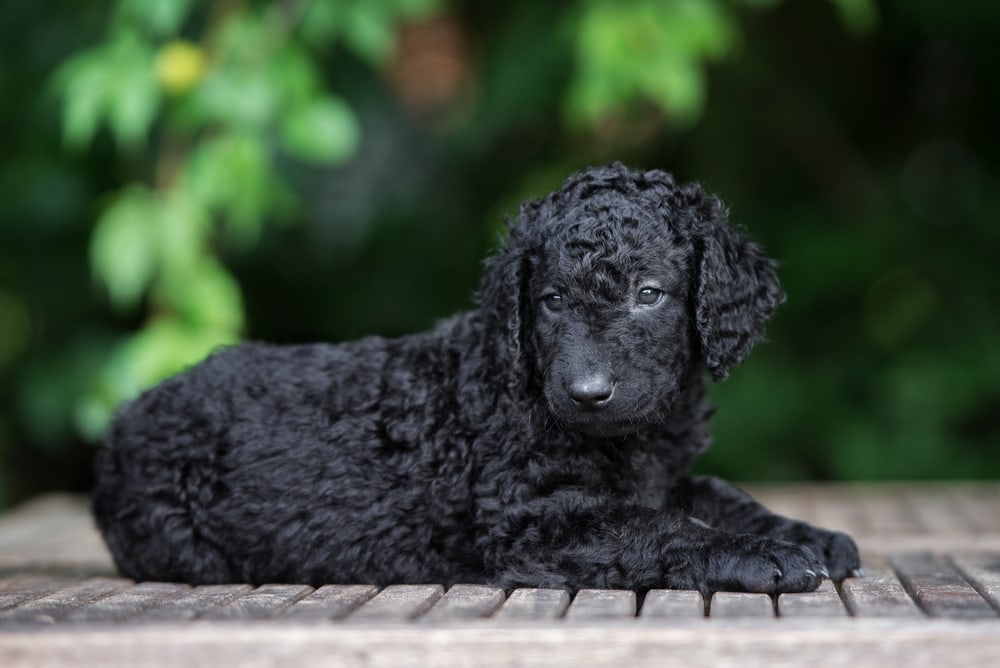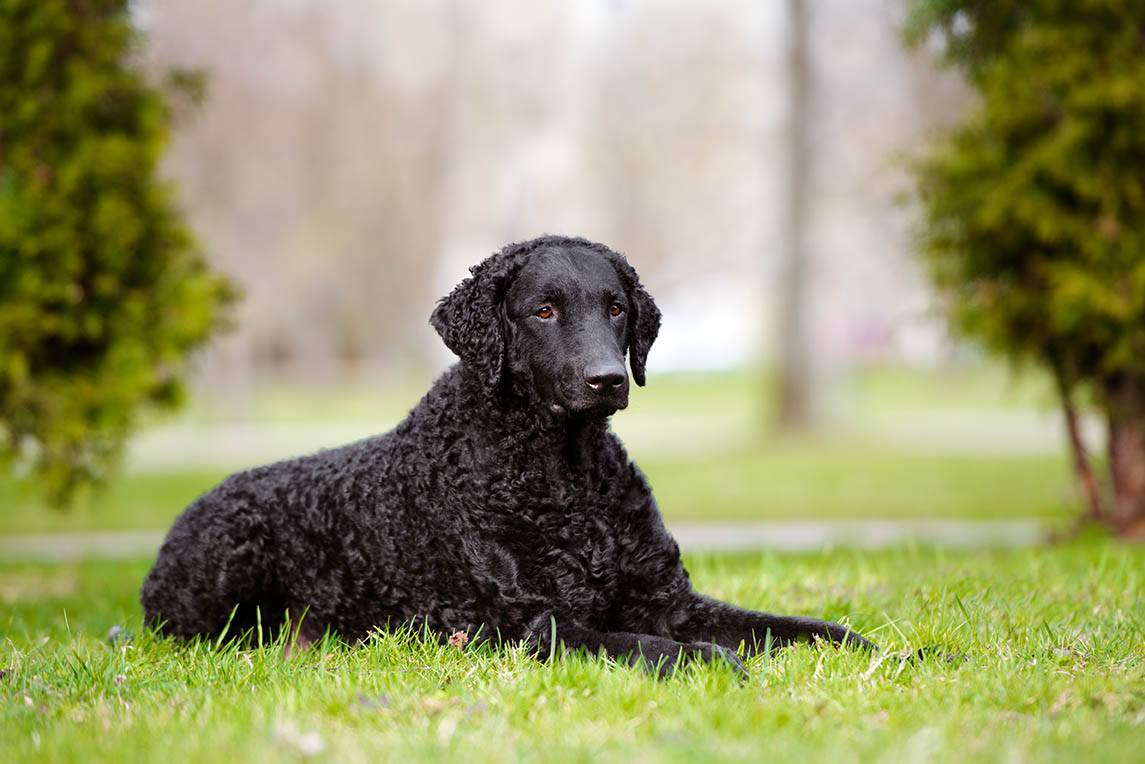
Click Below to Skip Ahead
Golden Retrievers are the classic picture of a great family dog, but their Curly Coated Retriever relatives make great family dogs too. Curly Coated Retrievers have super quirky curly hair, and they are one of the oldest retriever breeds.
Curly Coated Retrievers can make a great addition to many families. More specifically, they make great pets for active families who have big yards and who need a watchdog. In contrast, those who live in apartments or who are not active should steer clear of this breed.
Breed Overview
Height:
23 – 27 inches
Weight:
60 – 70 pounds
Lifespan:
8 – 12 years
Colors:
Black, brown, or liver
Suitable for:
Great for active families with a lot of space
Temperament:
Loyal, loving, suitable for being alone throughout the day
Nevertheless, Curly Coated Retrievers are a real gem in the retriever world. They are adorable, alert, and loving, but they are also rare to find. To find out more about this unique breed, keep reading. In this article, we cover everything related to Curly Coated Retrievers, including their history and maintenance needs.
Curly-Coated Retriever Characteristics
Curly Coated Retriever Puppies

It is unlikely that you will be able to find a Curly Coated Retriever puppy at a shelter. Instead, you will likely have to go to a reputable breeder. Only about 150 dogs are registered as Curly Coated Retrievers a year, which can make it really difficult to find one. Depending on where you live, you may have to pay more in order to find the puppy and be able to buy it from the breeder. Always make sure that the breeder you are buying the puppy from is reputable and treats the dogs with respect and care.
Curly-Coated Retrievers are energetic dogs that need plenty of space to burn all their energy. They do okay if they’re left alone because they’re highly independent. Make sure to read the full care guide to know how to take care of these fascinating and rare dogs.
Temperament & Intelligence of the Curly Coated Retriever
Today, Curly Coated Retrievers are known for being great watch dogs. At the same time, they are loyal, gentle, and loving with their family. Additionally, these dogs are really active. In fact, they keep their puppy nature until they’re about three years old. Some take even longer to mature.
In addition to being really active and fun-loving, these dogs are pretty intelligent. They aren’t necessarily the smartest retrievers, but they are far from dumb. These dogs pick up on commands pretty quickly, but they have a stubborn streak that means they might not listen to the commands.
Are These Dogs Good for Families? 👪
Curly Coated Retrievers make great family dogs. They are very gentle, loving, and fun to be around. Despite their large size, these dogs are even suitable for children. Of course, we always recommend supervising playtime between a dog and child, no matter what breed the dog is.
Especially with early socialization, Curly Coated Retrievers make great family dogs. If your family is active and has a lot of land, the dog will be super happy.
In the case that all family members are away from the home throughout the day, the Curly Coated Retriever will still be happy and healthy. Unlike many dogs, this dog can handle being alone throughout the day. Just make sure to provide toys to keep the dog stimulated.
With people who are not family members, Curly Coated Retrievers can be alert and suspicious. This makes them a great choice if you want a guard dog. The dog will not be aggressive towards the newcomers, but they will bark if they see someone new and may be a bit standoffish until they have a chance to warm up to the newcomer.
Does This Breed Get Along with Other Pets?
Curly-coated Retrievers typically are good with other animals as well. They don’t tend to be dog aggressive, meaning they should fit into a home with other dogs pretty well. However, Curly Coated Retrievers do have hunting instincts.
As a result, this breed is not as suited for homes with small animals, such as cats or rodents. With early socialization, Curly Coated Retrievers do learn to get along with cats, but that is not always the case with rabbits, guinea pigs, or mice.
We would advise against bringing a Curly Coated Retriever into a home with other small animals. However, it should get along with dogs and cats fine with early socialization.
Things to Know When Owning a Curly Coated Retriever:
Food & Diet Requirements 🦴
Curly Coated Retrievers are big dogs, which means they require quite a bit of food. On average, adult Curly Coated Retrievers need between 2.5 and 4 cups of dry food a day. It’s best to split this portion into two meals to avoid bloat.
You may need to look for high-quality dry dog food that is specific to your dog’s skin and coat condition. Curly Coated Retrievers are known for their fur. Foods that address their coat mean that the dog will appear happier and healthier for longer.
Exercise 🐕
Because of their hunting backgrounds, Curly Coated Retrievers are pretty active. They require extensive exercise and play time, especially when they’re still puppies. At the very minimum, Curly Coated Retrievers need 25-minute brisk walks every day, as well as time to run off the leash.
Curly Coated Retrievers are a great choice if you have a large backyard where they can roam. If you don’t, taking your Curly Coated Retriever to a dog park is a great alternative. On weekends, you can take your dog with you hiking, jogging, cycling, and a number of other activities.
It’s important to keep the dog’s heat tolerance in mind whenever you are out and about. These dogs are more suited for cooler temperatures. During hot summers, you will likely want to avoid bringing this dog outside for extreme exercise.
Throughout the day, provide your Curly Coated Retriever with different toys to play with. If this dog gets bored, it will likely become destructive from lack of mental stimulation.
Training 🎾
Curly Coated Retrievers are suitable for beginner to intermediate dog trainers. The dogs aren’t super stubborn, but they aren’t as easy to train as the Golden Retriever either. The key to training these dogs is to be firm and consistent.
If you assert yourself as the pack leader, your Curly Coated Retriever will likely start listening to your commands pretty quickly. You may want to incorporate socialization or interval training whenever you are working with your Curly Coated Retriever.
Grooming ✂️
Even though this retriever does have a unique coat, grooming isn’t that much more difficult than any other retriever. It sheds moderately, meaning you will need to vacuum often. Luckily, the coat is only a single layer that you need to trim every now and then. You will not need to brush their coat, or else it will turn frizzy.
There are some other grooming needs you will need to watch out for. For example, you need to brush their teeth, clean their ears, and trim their nails. You can easily do all of these grooming feats on your own, but you could also hire a groomer if you are uncomfortable doing so.
Health and Conditions 🏥
Unlike other retrievers, Curly Coated Retrievers are not particularly healthy. They only live between 8 to 12 years, and they have many health conditions to be aware of. You can help discourage these illnesses by feeding your dog a high-quality diet and exercising it frequently. Still, the dog may get sick as it ages. Certain minor conditions can also be avoided with proper grooming practices.
Male vs Female
There is little difference between male and female Curly Coated Retrievers. Females may be a bit more expensive for breeding purposes. It is completely up to personal preference which sex you get.
3 Little-Known Facts About the Curly-Coated Retriever
1. It’s one of the oldest retrievers around.
Even though Golden Retrievers and Labrador Retrievers are more popular, the Curly Coated Retriever is one of the oldest retrievers. Experts believe that this retriever originated in England. Supposedly, it is a mixture between a Saint John’s Newfoundland, Poodle, English Water Spaniel, Retrieving Setter, and the Labrador.
Experts can only guess which dogs Curly Coated Retrievers originated from because their breeding history is not distinctly known. Still, it is believed that these dogs were used by English gamekeepers, hunters, and poachers since they are great on both water and land.
Experts know for certain that Curly Coated Retrievers have been used since the late 1700s. These dogs even appeared on the English dog showring by 1860. Still, the Curly Coated Retriever was favored among hunters, up until the 20th century.
2. They almost died out in the 20th century.
During the 20th century, many dog breeds almost disappeared completely, including the Curly. The first drop in Curly Coated Retriever numbers happened during World War One. by the end of World War Two, the dog was nearly extinct, even though it had been introduced in the Americas just a few years before World War One started.
3. They experienced renewed interest in the 1960s.
Luckily, Curly Coated Retrievers did not die out during World War Two. In fact, there was a resurgence in interest in this breed in the 1960s. By 1979, the Curly Coated Retriever Club of America was formed. Although this club is low in numbers and the breed is still rare, Curly Coated Retrievers are not in danger of extinction anymore.

Final Thoughts
Curly Coated Retrievers are a really interesting retriever. Even though they are lesser known than their other retriever cousins, this is actually one of the oldest retrievers around. Today, these dogs are not very common, which means you will have to pay a pretty penny from a reputable breeder in order to bring one of these puppies home.
If you are able to find a Curly Coated Retriever for sale, it can make a great addition to just about any active family. Especially if you have a lot of yard for the dog to play in and are active yourself, a Curly Coated Retriever can be a great addition. Just remember to be firm when training and socialize it early for best results.
Featured Image Credit: otsphoto, Shutterstock





